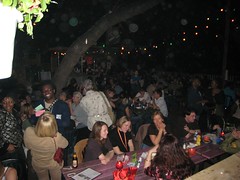BlogHer conference coming up!
I’m madly excited about the upcoming BlogHer conference – I’m on a couple of panels – Moderating “Does the Blogosphere need an intolerance intervention” with its somewhat ambiguous stance, and filling in at the last minute for Grace Davis on day 2 of the conference in “Blogging: The Voice for Silenced Communities“. I really, really, love a good juicy panel discussion with a ton of participation and ideas exploding everywhere that send you off thinking and inspired. That’s how it will be, the entire conference — with the added torment of knowing that in the next room something else just as interesting is happening and you’re missing it!
BUT THE PARTIES! Oh my god we’re going to have fun.
And the strange pajama parties at midnight in our swanky hotel rooms (fancy yet crammed with 4 of us to a room) with laptops and compromising photos and books and cameras! Our silliness will not be contained and must spill over onto your internets!
And the hallways where I will park myself and geek out and get to meet people I have admired from afar and they turn out to be just regular people with shy smiles who are nice.
I think best of all I like meeting amazingly witty shy people who have gem-like beautiful blogs and are not scrambling after fame and fortune or trying to Optimize for Business. It makes me think of how I love to make little xerox zines and distribute them for free. It is still a culture of DIY and abundance and love.
But on another level all the businessy social capital networky things are also beautiful. The first BlogHer conference gave me a lot of confidence and belief that my weird useless literary hobby was appreciated. I met so many people who continue to be useful to me, not like I call them up and go “Give me a job, and I’d like my own Lear Jet to the conference, cause i am internet famous” but just in that we know we exist, in awareness of each other, and that is comforting and inspiring. Just that I know all the people I met at the first Blogher conference still amazes me. Instead of being a lone wacko in my garage transmitting ham radio waves into outer space (as I felt while blogging solo) I am part of this amazing community and I have professional and literary colleagues.
I looked at my Facebook social timeline and saw how it is basically an explosion of friends stemming from BlogHer 2005. That’s so amazing. And as a feminist I appreciate, especially, the connections with other women, so often disrupted by capitalism, nuclear families, and all the pressures of our lives under patriarchy. BlogHer helps me live my life more the way I have always wanted to, with strong ties to other women.
Actually, Woolfcamp helped that too. And I still hope to see others do some decentralized women-blogging and tech meetups that are small unconferences, just get together with your laptops and start showing each other all your geeky stuff, even just how you blog and what tools you use. And I guarantee that among 3 or 4 people you will all learn something and be fortified and inspired. It is a sort of nucleation and sharing of information that makes everyone involved become bigger.
Back to the practical universe. I will be flying out on Wednesday, will stay with my sister-in-law and her family one night in Oak Park, and then off to the W Hotel. I am rooming with SJ of I, Asshole, one of my earliest blog friends. Actually I was her stalker for a while until she noticed me in her comments (as is so common with these blog friendships!). And with her friend Shauny who I don’t know but who I’m sure will be fun. BLOG PARTY IN MY ROOM and you are all invited.
I will miss Grace Davis a lot and will be thinking of her and extending magic tentacles to her this week and next… and I will save up a lot of fun for her and when she is ready I will go and bring it to her house and pour it in her lap. I was thinking that a Woolfcamp in the park would be awesome. I will find a beautiful place with lots of nature AND wireless and we will all go and have a blogging picnic specially in Grace’s honor.
Meanwhile, I am gearing up to write for BlogHer again. I took a 6 month leave, because I got a full time job and an extra part time job and could not handle so much work. But I am ready to get back to blogging about blogs by women from Latin America (including the Latin America that intersects with the United States, i.e. blogs by Latina/Chicana women). I miss all the blogs I used to read and the fun emails and am looking forward to getting back into it with a weekly post. If you have a favorite blog, in Spanish or English, and I will try Portuguese as well, please send me the URL and a description of the blog and blogger and I’ll add them to my feed!
